Some critics describe Jane Austen’s works as novels of social comedy. When she wrote Pride and Prejudice she was just twenty-one years old. Her literary life was comprised between 1786 and 1817. A characteristic for the eighteenth century was the quick change of literary taste. Morals were always corrupt and the common life was still rough and full of superficial manners, but one thing changed during the last years of the 18th century: Sentiment got more and more popular and refined. There was space for a new kind of fiction, which was a comedy of life and manners. In the world of novels she can be described as a supreme pioneer of comedy. In her social comedy she combined her gifts in writing wit and satire totally effortless.

---Howard Jacobson tells the story of his father, a man who never read a book in his life, and who “liberated” Jacobson by dying. “This is me being funny and touching, you’ll have read all about that…” he explains. Jacobson’s father was, among other things, a childhood magician. But the magician’s house was puritanical - the body could never be discussed - and Jacobson grew up shielded from the world by his over-protective father. When his father died, Jacobson was exposed, on his own, and “a writer needs to be on his own”. But, he says, “my father was the one that gave me the comedy, the seriousness, and now he’s gone…I’m vulnerable, just be sorry for me.”---
…Howard Jacobson won the Man Booker Prize for Fiction this month with “The Finkler Question,” a dark comedy about a man convinced that tragic love is his destiny. It is the first overtly comic novel to win the prize in its forty-two year history.
Accepting the honor, Jacobson said it strengthened his belief that entertainment and good literature are not incompatible: “The better the writing, the more fun there is in reading it.”The judges praised Jacobson, 68, for the book’s impressive range of tone, humor and melancholy. “It knows something that Shakespeare knows in the great comedies — that the relationship between what’s tragedy and what’s funny is intimately linked,” said the chairman of the judging panel, former U.K. poet laureate Andrew Motion. “The novel is comic but it’s laughter in the dark.” ….
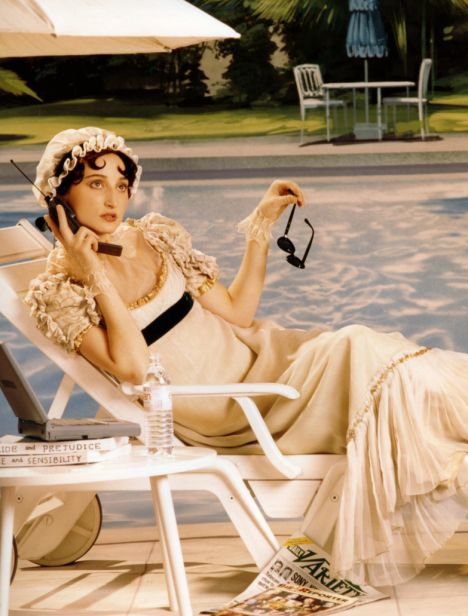
Vriginia Woolf: ...who resent any slight upon Austens genius as if it were an insult to the chastity of their aunts.' Perhaps her most delightingly unexpected acolyte, though, was the French anarchist Felix Feneon, who came across Northanger Abbey while in prison accused of masterminding a terrorist bomb attack. He saw her as a kindred spirit and devoted himself to translating the novel into French. Through him, her work came into the circle of Gide, Toulouse-Lautrec and Mallarme and she found her place as an influence on France's symbolist avant-garde. She took her place, too, in the trenches of World War I, where her influence was memorialised in Rudyard Kipling's story The Janeites.
Virtually the entire body of Jane Austen’s work is comedy, yet there is a great deal of variation in it. She began with pure- the unsurpassable- farce: “Love and Freindship” She wrote this as a young girl, but she spelled “freinship,” and beleive” and “adeiu” that way to the end of her life. Another of her “juvenilia” , “Lesley Castle”, contains some of the most hilarious inspirations in all comic literature. In “Sense and Sensibility” the Don Quixote- Sancho theme, which appears in a singularly burlesque disguise in “Lesley Castle” , is transformed into a high comedy contrast between excessively sober and sensible Elinor and her determinedly romantic sister, Marianne.
…Few contemporary novelists here write explicitly about the experience of Jews in Britain, a state of affairs that could be debated as exhaustively, and probably with as little resolution, as Treslove and his friends debate the issues that consume them in “The Finkler Question.” Because of his rare position in the literary landscape, Mr. Jacobson has been called the “English Philip Roth,” but he says he would prefer to be “the Jewish Jane Austen.” “I’m an English writer who happens to know about Jews and would like to write like Jane Austen, with a little bit of Yiddish,” he said…. ( Sarah Lyall )
In “Pride and Prejudice” parody is abandoned altogether and English social comedy is born, but literary parody continues, a little heavily for Jane Austen, in “Northanger Abbey, in which the dreary charms of Gothic ruins and thrills of horror made popular by Mrs. Radcliffe are given much the same treatment that Moliere gave the bluestockings and the “précieuses” of his time.

Michael Thomas Ford:week after we sent out the proposal I had a three book deal and was writing the first one. But that’s when another problem presented itself: Just how vampire-y were the books going to be? I knew I wanted Jane’s vampirism to also work as an allegory about her remaining “alive” through her work but unable to enjoy any of the profits being made from it. After all, the book is called Jane Bites Back. There had to be some revenge in it somewhere. But I didn’t want it to be too bloody. That just wasn’t very Austenish.
Jane Austen was born into a world of foolishness. Everything that surrounded her was prim, trim and proper. There were leafy parks and smooth lawns. Jane Austen’s talents developed from the scenario of tiresome and ordinary eighteenth-century village life. Her senses were very sensitive in detecting foibles of human character . That was the main thing about her works.The attractive thing or the secret spice in Jane Austen’s works is the exact reflection of life. Her genius lies in the perfect and unique simplicity. Her plot is as natural and inevitable as a problem in mathematics. The reader does not get the impression of reading a book. He rather feels magically transported into the eighteenth century life. Sometimes Jane Austen is compared to Shakespeare because there is the same criticism of life and the quick irony which exposes it . Like Shakespeare, Jane Austen was an ironical censurer of her contemporaries. Her ironical critics were not shown directly. She uses an indirect method of imitating and exaggerating the faults of her models.
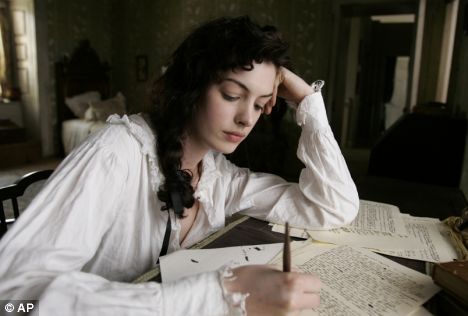
Sam Leith:Far from being demure and unworldly, she actually sounds to have been rather formidable: 'perpendicular, precise, taciturn - a poker of whom everyone is afraid'. She could be bolshy, acidic, astringent: a Miss Austen, not a little Jane. And as a writer who explored with unprecedented spryness the connection between the affections of the heart and the contents of the wallet, why but by sexism should she be cast as a dreamy little scribbler? 'Tho' I like praise as well as anybody,' she wrote pertly in 1814, 'I like what Edward calls Pe
, too.' When it was clear the secret of her authorship was out, she determined: 'I shall rather try to make all the Money than all the Mystery I can of it.' Pride And Prejudice is a chamber piece, Emma is a masterpiece, and Northanger Abbey is gloriously funny. Of Mansfield Park, it was rightly said that the hero is a pompous ass and the heroine a little prig - but it's still a cracking book. Read more: http://www.dailymail.co.uk/home/books
… Howard Jacobson: To my ear the term “comic novelist” is as redundant and off-putting as the term “literary novelist”. When Jane Austen rattled off the novel’s virtues in Northanger Abbey – arguing that it demonstrated the “most thorough knowledge of human nature, the happiest delineation of its varieties, the liveliest effusions of wit and humour . . . conveyed to the world in the best chosen language” – she wasn’t making a distinction between the literary novel and some other sort, or between the comic novel and the not so comic. The liveliest effusions of wit and humour are simply what the reader of a novel has a right to expect.
The two rogue terms I’m addressing – literary and comic – share a vice: they both make exceptional what should go without saying. The novel was born of restless critical intelligence, and it was born laughing. “It pleases me to think,” said Milan Kundera, in the course of accepting the Jerusalem prize for literature in 1985, “that the art of the novel came into the world as an echo of God’s laughter.” If this is so, then talk of the comic novel is tautologous. If we are to be true to the form there will be only “novels” and they will be effusive with wit and humour; thereafter, to help the bookshops categorise, we can allow all the sub-species they have shelf-space for – the novel of distended plot and fatuous denouement, the novel of who cares who dunnit, the novel of what Orwell in his great defence of Henry Miller called “flat cautious statements and snack-bar dialects”, the novel, to sum up, of anorexic mirthlessness. But let’s not forget that those are the anomalies. …
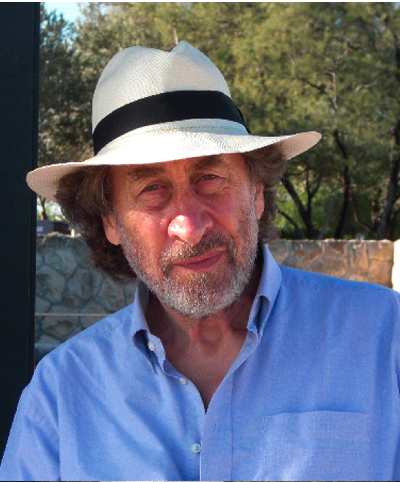
Jacobson: ....in order to refute the usual absurd charges of miniaturism made against Jane Austen, and to remind us that there is no bigger story or grander theme, nothing that bears more seriously upon our humanness, than the perturbations of a single heart.
With “Mansfield Park” Jane Austen took a new direction, away from satire and epigrams and toward a more mellow and subtle form of comedy. in one of her letters she announced somewhat surprisingly that the subject of her book in progress was ordination. At first glance the calling to the priesthood seems an unpromising subject for comedy, nor is it likely that many of her readers are aware that ordination is the central theme of the book. Yet closer examination reveals that this indeed is the subject and that Jane met her challenge brilliantly.
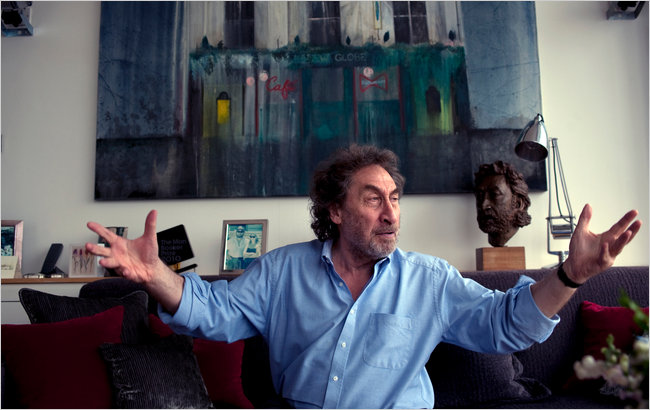
Sarah Lyall: .... But mostly, he said, he adheres to the notion, as one of his characters says, that “as a Jew, I believe that every argument has a counterargument.” Mr. Jacobson said: “Once we accept there’s a constant to-ing and fro-ing of understanding and misunderstanding, all is possible. Here’s the wonder of the novel. The novel is the great fluid form in which all those possibilities flow in and flow out. Nothing is definite, nothing is finished, nothing is determined.” Mr. Jacobson grew up in working-class Manchester, to a father who worked as a children’s entertainer and who ran a market stall selling trinkets. Bright, bookish and intellectually ambitious, he studied English literature at Cambridge under the legendary F.R. Leavis. “I’m an old-fashioned English lit. man,” he said. “Straight down the line — it’s George Eliot, it’s Dickens, it’s Dr. Johnson, it’s Jane Austen.”
Fanny Price, the Bertrams’ adopted poor relation, embodies Christian humility, love and patience. Edmund Bertrum, her cousin and protector, being both an English gentleman and a Christian, cannot escape the conflict inherent in these qualities and remains fascinated by the cynical, elegant Mary Crawford until his eyes are opened to her shallowness and to Fanny’s love- which constitutes his true consecration as a priest. Henry Crawford, the only demonic character in jane Austen’s fiction, might be a fugitive from Choderlos de Laclos’s “Liasons dangereuses”; yet even the compulsive Don Juanism that makes him, at first, desire Fanny as a novel subject for seduction, eventually succumbs to her gentle sweetness.

"It has often been said that an original writer has to create the taste by which he is appreciated; it may be remembered also that the original writer often unconsciously discerns an altered or a new taste in the public before the public itself is quite aware of the change. One of the most remarkable characteristics of the closing decades of the eighteenth century was the rapid change of literary taste. The tone of society had altered. Morals were perhaps not less corrupt than in the days of Defoe, but sentiment had become more refined. The common life of the time was still coarse, and abounded in the abominations which Hogarth has exposed with a truth and realism unrivalled in art; but there was also a genuine movement towards a more delicate apprehension of life. The brutality of Swift had become disgusting to the new generation; the frank realism of Defoe and even the masculine satire of Fielding were scarcely less palatable. There was room therefore for a new kind of fiction, which should be a comedy of life and manners."
Fanny’s aunts, Lady Bertram and Mrs. Norris, are mitigated embodiments of the cardinal sins of Sloth and Envy. Sir Thomas Bertram, master of Mansfield Park, combining gentleness and justice with a rather stiff and forbidding dignity, is respected by some of the members of the cast as their judge and conscience and feared by others as a wet blanket. He is a father figure, and if it were not for the fact that he, too, has his small faults, he would be a godlike figure. As it is, he seems to embody the moral integrity of the English character, while Mary and Henry Crawford represent the cold and corrosive cynicism of the London smart set.
Mansfield Park itself, in which nearly all the action takes place- except for the descent into Hell that is Fanny’s trip to Portsmouth- stands quite explicitly for all that is dignified, civilized and traditional in England. The subject of “Mansfield Park” is not merely ordination but the meaning of religion in the English social fabric. It is the kind of religion in which it would be regarded as bad form to mention God outside a sermon or an oath, and in which the truth of “religious principles” is demonstrable chiefly by their influence on proper social conduct- a formula that has worked out remarkably well in England.

William James Dawson:The genius of Jane Austen lies in this perfect and even severe simplicity. Her characters evolve themselves without anyiaid of dramatic episodes. Her plot is as natural and inevitable as a problem in mathematics. Everything is fitted together with the most delicate contrivance, with the art that effectually conceals art. From first to last the atmosphere is exquisitely lucid, the style distinct and firm, the figures, in spite of the old-fashioned stiffness of their phrase and gait, so vital that they are more real to us than many of the people we have dined with. We feel, not that we have read a book, but that we have been magically transported into the eighteenth century, and have breathed its air and lived its life.
To explain the novel in such terms tends to make it appear to be an allegory, which a novel should never be. It is nothing of the sort: Jane Austen’s tour de force consists in never even suggesting than an allegory might be intended. The actors act out of the given necessities of their characters and their situations; the abstractions they might embody are never hinted at; the mood is one of subdued comedy; though the deplorably moralizing last chapter is out of keeping with the rest of the book.
In “Emma” Jane Austen did not attempt so complex a theme; it is a high comedy of character and probably her supreme achievement in that vein. “Persuasion” is the least sparkling of her books: apart from Sir Walter Elliot, who is a caricature, it contains no truly comic figure. Yet it glows more warmly than any of her other novels, and there is a touch of subdued romanticism in it.
Austen expresses her contempt, severity or cynicism by using irony. In 1870, Richard Simpson identified this as her characteristic tone. Her use of irony is often described as cruel or merely humorous. Lionel Trilling says: “sooner or later, when we speak of Jane Austen, we speak of her irony, and it is better to speak of it sooner rather than later because nothing can so far mislead us about her work as a wrong misunderstanding of this one aspect of it ”. He thinks that irony is a fundamental element in Jane Austen’s works with the exception Mansfield Park. In this novel the ironic undertone seems to be absent, according to Sandie Byrne.
Jane Austen combines more than social criticism and humour. Under the humoristic surface there is also erotic. Emma Thompson, writer of the script to Sense and Sensibility, said that Jane Austen is sexual. By signs of the body or dialogues of her characters she shows their erotic ulterior motives. As well as the people’s need to get humoristic entertainment she realized the need of sex. For that Jane Austen can be called a professional artist in combining different desires of people (Elsemarie Maletzke )
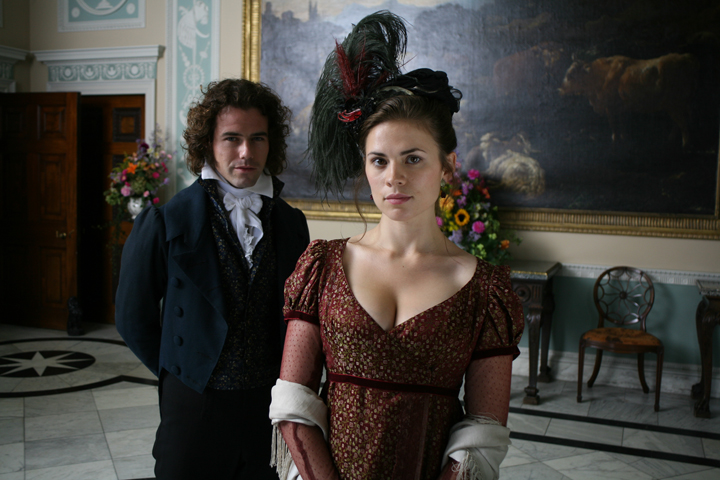
Monteiro Belisa:the humor of Austen's comic narratives not as a didactic tool of a particular political or moral agenda but as a recreationally antagonistic wit. My study of this quality of wit as it appears in the character of her comic heroines as well as the voice of her ironic narrator shows how Austen's comedy participates in the Western tradition of komos --that is, comedy as a revelry in mischief. Liberated from what Charles Lamb calls "the burden of a perpetual moral questioning," Austen's mischievous humor specializes in truths uncongenial to the sentimentally-based morality of the novel of courtship and marriage, but fundamental for the moral clarity and complexity of her comic art.
ADDENDUM:
It may perhaps be an inducement to many who profess themselves unable to read Jane Austen to be reminded that she is one of the truest humorists and keenest wits who ever handled the English language.
The comparison between Jane Austen and Shakespeare, suggested by both Macaulay and Mr. Goldwin Smith, is ingenious, and, within the limits drawn by these great critics, just; but Thackeray affords us a closer comparison. The spirit of Jane Austen is entirely the spirit of Thackeray.

Jacobson:That you ask the question “Why?” and then back you go to the Holocaust and back to the pogroms before that, and everyone wants to know what it is that’s made this particular kind of Jewish morbidity into a positive feature now of the Jewish imagination. So, the book was really about that. Jews thinking about Jews talking about Jews to Jews written by somebody who is a Jew, who is obsessed by the subject, has some crazy obsession, who wants to get to the bottom of this obsession and wonders where this obsession comes from. And will deploy every kind of act of the mind to think about it, including, primarily, what Jews do best, which is make jokes. No one makes jokes like Jews.
There is the same criticism of life; the hatred of shams, and the quick irony that pierces and exposes them; the delightful turns of expression, the caustic word which is not readily forgotten, and the humour, half genial and half sardonic, by which the facts of life are illumined. The only difference is that, while Thackeray was really angry with snobs, Jane Austen is too conscious of their absurdities to be irritated over them. Thackeray can be very bitter; but Jane Austen gives her most caustic criticisms a flavour of humour which robs them of ill-nature. When it becomes a question of pathos, Thackeray out-distances Jane Austen completely; but probably that is due simply to the fact that in 1850 writers did not deem it necessary to disguise their tenderer feelings, and in 1811 they did.
A woman who carefully concealed the fact that she was a writer, and wished only to be loved and trusted for her womanliness, would not be likely to uncover the depths of her heart even in books. Jane Austen was trained in the tradition that regarded any display of deep feeling as unwomanly, and the real reticence and modesty of her nature made the expression of pathos as difficult as it was undesirable. But on her humour she put no restraint save that of kindliness, and keen as is her irony it is impossible to accuse her of cynicism. In this also she resembles Thackeray, who concealed beneath the assumed savageness of the satirist the softest and most human of hearts. ( William James Dawson )








 COMMENTS
COMMENTS



